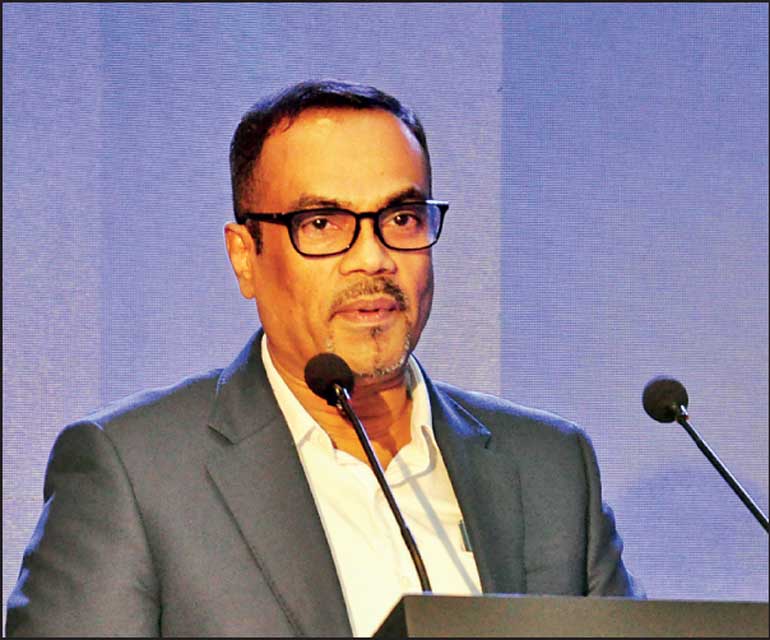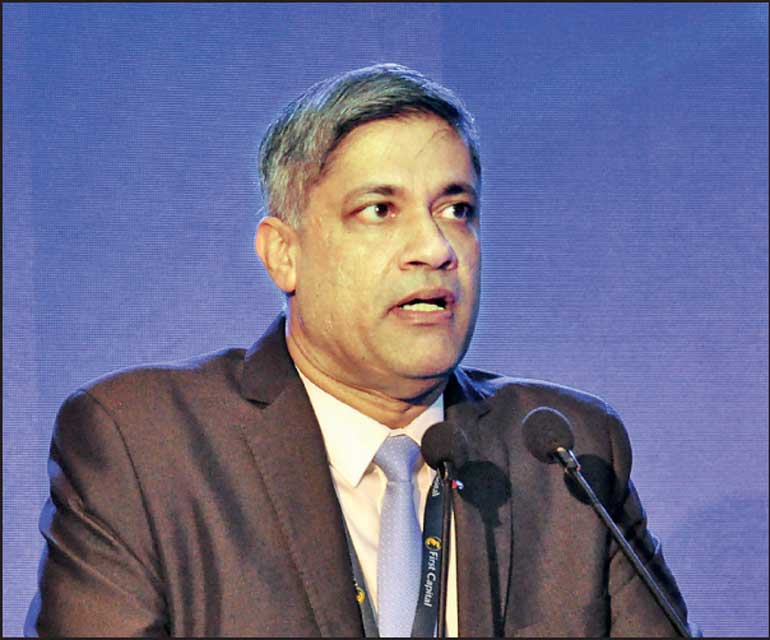Monday Feb 16, 2026
Monday Feb 16, 2026
Wednesday, 22 January 2025 00:26 - - {{hitsCtrl.values.hits}}

Moderator – First Capital Holding Corporate Finance and Advisory Vice President Deshani Ratnayake, John Keells Holdings Group Finance Director and Deputy Chairman Gihan Cooray, Brandix Lanka Managing Director Hasitha Premaratne, NTB Independent Non-Executive Director Rachini Rajapaksa and First Capital Holdings Chief Research and Strategy Officer Dimantha Mathew - Pix by Sameera Wijesinghe

Economic Development Labour and Deputy Minister Prof. Anil Jayantha

First Capital Holdings MD CEO Dilshan Wirasekara

By Janani Kandaramage
First Capital, hosted the 11th edition of Investor Symposium last week with over 300 invitees and 400 participants online.
The focus of this year’s symposium was Sri Lanka’s Economic Outlook for 2025, with a comprehensive analysis of market forecasts, strategic investment approaches and emerging opportunities within the country’s capital markets. Bringing together a diverse group of investors, corporate leaders, entrepreneurs, and industry experts, the evening provided a platform in engaging in insightful discussions about the future of the local economy via critical discussions and valuable networking opportunities.
The highlight of the symposium was the keynote address delivered by Labour Minister and Economic Development Deputy Minister Prof. Anil Jayantha Fernando. Prof. Jayantha presented a nuanced outlook for 2025, offering an expert perspective on Government initiatives, the nation’s economic trajectory, and the key factors poised to shape market conditions in the year ahead.
Highlighting the objectives of the administration, the minister emphasised the state’s crucial role in striking a balance between private interest and public interest. “It is essential that we ensure private interest does not inhibit the collective interests of society. This is when the Government steps in, to ensure stabilisation on all fronts including financial, political, fiscal stability and technological stability. This will bring us closer to our Clean Sri Lanka initiative, which will ensure no one is deprived and everyone receives a minimum income. By prioritising stabilisation in these targeted areas, we will also be ensuring that we are closer to reaching our GDP target of Rs. 33 trillion this year.”
Political stability, he said, has been navigated in the new regime with the significantly lowered disruptions and conflicts between ministries. He alluded financial stability to improvements in the macroeconomic indicators of the country including economic growth, falling inflation, and increases in export revenue particularly due to the thriving tourism sector. He acknowledged that while there was still a need for progress, particularly in focusing on income inequalities and job security, he assured that the Government has made significant progress and will continue to make progress.
Speaking about fiscal stabilisation, he noted that the NPP is committed to broadening the tax networks in 2025. The Government received the highest tax revenue in 2024 with and is committed to utilising this revenue to encourage social security spending to disadvantaged groups. With enhanced tax collection systems and the reduction in payee taxes which posed a burden to middle-low income earners, Prof. Jayantha believes that fiscal stabilisation can be eventually achieved. Nevertheless, he accepted the limitations to technological stability due to inadequate digitisation in the economy. “Although most operations in the nation lack technological advancements, our administration remains steadfast in our commitment to promoting digitisation in economic activities.”
The event also featured a distinguished panel discussion, moderated by First Capital Holding Corporate Finance Vice President Deshani Ratnayake. The expert panel included John Keells Holdings Deputy Chairman/Group Finance Director Gihan Cooray; Brandix Lanka Managing Director Hasitha Premaratne; Nations Trust Bank (NTB) Non-Executive Director Rachini Rajapaksa, and First Capital Holdings Chief Research and Strategy Officer Dimantha Mathew.
Speaking about strategies to build resilience within the tourism sector, Cooray emphasised the need to effectively leverage technology in launching enticing destination marketing campaigns. While acknowledging the exceptional performance of the tourism sector in 2024, he stressed the importance of diversification as a means of targeting the varying preferences of tourists, such as wellness tourists and city tourists. Although landmarks such as Cinnamon Life at City of Dreams and Port City are key milestones, he urges that more efforts can be made to boost investor confidence further.
Premaratne discussed the challenges faced by the apparel industry, particularly during the pandemic with the sudden drop in sales. “By 2021, however, with the surge in online shopping we were forced to accelerate our capacity. We generated significant sales revenue. However, when the economy started to open up post COVID-19, we began to experience shortfalls in revenue as people prioritised travel over retail shopping.” He noted that to maintain the apparel industry’s position as a key export hub in Sri Lanka, the industry must enhance its productivity via automations and alterations in the cost structure. Dimantha Mathew, who carries a wealth of experience in investment banking stated that public-private partnerships will guarantee safety nets for public expenditure as the risks and responsibilities are shared, eliminating the financial burden on the Government. By reducing the strain on the budget, the Government can ensure long-term stability of its services, attracting both foreign and domestic investors who are incentivised due to the lowered risk.
Matthew also expressed optimism for the bond market in 2025, noting that, “the fair value target for the All Share Price Index (ASPI) has been revised to 17,000, citing robust earnings growth outlook of 22% for 2025. Continuity of the IMF program and lower interest rates are key supporting factors for the market. If the ASPI exceeds 17,500 and approaches 18,000, investors are advised to consider profit-taking and reallocating exposure to other asset classes, such as fixed-income securities or other stable investment options.”